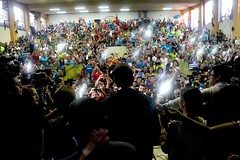 |
| Nayib Bukele, Mayor of San Salvador. |
By Hilary Goodfriend
With the roster already closed for the March midterms, Bukele’s expulsion from the FMLN leaves him unable to run for a second term as mayor. But the ouster has freed him to pursue his higher aspirations full-time.
As all forces prepare for the 2019 presidential election, the FMLN seeks to defend its control of the executive branch and with it, hard-fought gains in social investment, infrastructure, and democratic reforms. Meanwhile, right-wing elites are hoping to regain control of the presidency to resume ransacking public resources for personal gain and further entrench the neoliberal model that they had previously imposed over the course of decades of U.S.-backed rule.
Bukele has now thrown his hat in the ring as an independent. But while Bukele claims to reject the political system, his politics are hardly innovative. He proposes no formal changes to El Salvador’s vastly unequal economy, ravaged by decades of free trade, privatization, and deregulation. He favors online campaigning over grassroots organizing, but he declines to use his formidable virtual platform — or army of internet trolls — to take a stand on a host of critical material issues facing poor and working class Salvadorans. In lieu of a platform, he rallies his base of “Nayilibers” (a play on the term for Justin Bieber fans) around his self-proclaimed ingenuity and integrity. While the FMLN can claim to stand for protecting water from privatization or partially decriminalizing abortion, Bukele’s project is, essentially, himself.
Behind the anti-establishment rhetoric and trademark backwards baseball cap, Bukele’s centrism and disdain for organizing places him squarely in the camp of the failing technocratic (neo)liberalism advanced by the U.S. Democratic Party, in which politics is not a struggle over resources and power between adversarial interests, but rather the domain of expert managers who, with the right tools, can resolve any crisis. In a country with a long tradition of organized political struggle, this tepid, individualized discourse is particularly toxic.
On the electoral field, Bukele now joins fellow Salvadoran capitalists who, no longer content behind the scenes, are elbowing out the middlemen and jockeying to take the reins themselves. Both of ARENA’s top presidential contenders ranked in a recent report on El Salvador’s six richest men, as did Bukele himself. So far, neither ARENA’s oligarchs nor the black sheep Bukele have offered anything like a political platform, leaving voters to stake their preferences on photogenics.
The FMLN’s likely presidential pick is Gerson Martínez, a former guerrilla commander who turned one of El Salvador’s most corrupt ministries under ARENA, the Ministry of Public Works, into a flagship of FMLN governance. Martínez is an honest public servant, but he belongs to the orthodox old guard of revolutionaries that Bukele hopes to leave in the dust.
The upcoming votes will test the FMLN’s ability to counter the opposition’s reactionary onslaught with a progressive political proposal that appeals to those who might otherwise be seduced by Bukele’s media savvy. To do so, the party will have to find new strategies to engage the post-war generation.
The current comandancia carefully stewarded the FMLN from combat into civilian life and through successive electoral victories under extraordinarily adverse conditions. But 25 years after the signing of the Peace Accords, these stalwarts have been reticent to cede the reins to younger militants. Bukele is, in many ways, a monster of the FMLN’s own creation. To defeat him, and to ensure the continuity of its own revolutionary project, the party will have to cultivate radical new voices from within.
The 2019 elections in El Salvador are already proving a critical battleground, both for the region’s resurgent Right, and the embattled Left. Bukele’s presence in the elections only further shifts Salvadoran politics toward vacuous, personality-centered discourse and away from that of a collective, emancipatory project. Certainly, the serious problems of violence and inequity facing El Salvador demand dramatic, structural changes. But in a struggling country already named for one savior, Bukele’s one-man approach is unlikely save the day.
Hilary Goodfriend is a writer and researcher based in San Salvador, El Salvador. She writes about empire, neoliberalism, and resistance.
















0 comments:
Post a Comment